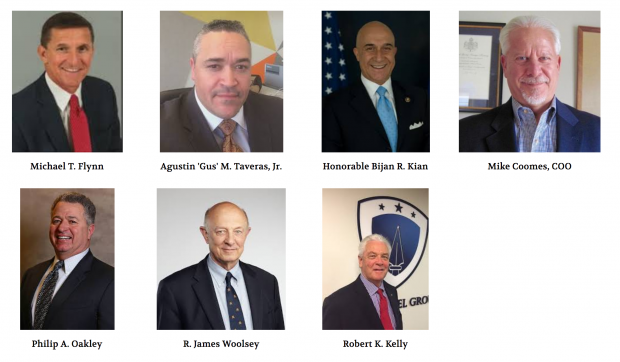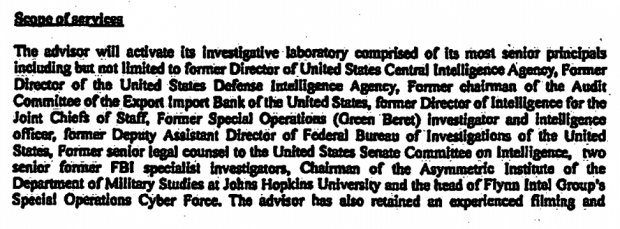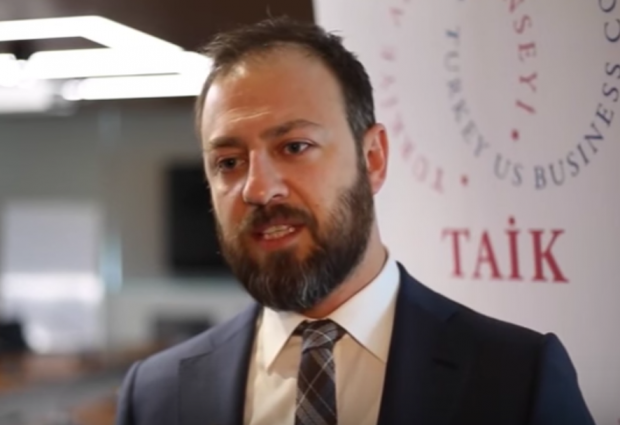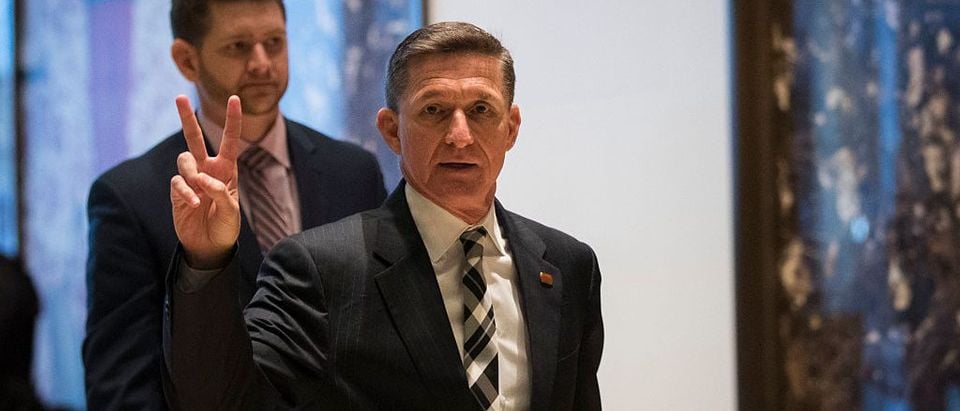While serving as a top adviser on Donald Trump’s presidential campaign, Michael Flynn signed a contract in which he agreed to utilize an “investigative laboratory” made up of elite former intelligence officials, including a former CIA director, to conduct research and make “criminal referrals” on behalf of a Dutch shell company linked to the Turkish government, federal records show.
But Flynn appears to have over-promised on the contract, which was signed on Aug. 9 between his firm, Flynn Intel Group, and Inovo BV, the shell company.
R. James Woolsey, the former CIA director identified by his title in the contract as a member of Flynn Intel’s “investigative laboratory,” says he was not aware of and never agreed to perform any of the work laid out in the contract.
The investigative work promised by Flynn Intel was most likely focused on Fethullah Gulen, a Muslim cleric exiled in the U.S. whose extradition is being sought by the Turkish government.
Flynn Intel, which shut down in November after Flynn accepted Trump’s offer to serve as national security adviser, filed the contract with the Justice Department on Tuesday as part of a retroactive registration as a foreign agent of Turkey. (RELATED: New Disclosures Reveal The Next Scandal That Would Have Hit Michael Flynn)
The contract called for Flynn Intel to receive $600,000 in payments over three months from Inovo BV, a sole proprietorship registered to Ekim Alptekin, the head of the Turkish-U.S. Business Council (TAIK), a business group that has come under increased control of the increasingly authoritarian Turkish government.
Flynn’s filing has already caused a headache for the White House, both because of the national security implications — Flynn attended classified briefings during the time he was under contract with Inovo — and for what it says about the Trump administration’s vetting processes.
Flynn, a retired lieutenant general, was fired just 24 days into his tenure last month because, according to the White House, he misled Vice President Mike Pence about phone calls he had with Russia’s ambassador.
The new revelations about Flynn’s work for Inovo are also likely to raise questions over the propriety of an elite unit of former intelligence officials tasked with conducting surveillance and research on Gulen for the Turkish government.
But a secondary issue for Flynn arises from Woolsey’s statement that he did not approve the work attributed to him by Flynn Intel.

Flynn Intel Group roster (Archived FlynnIntelGroup.com website)
“Ambassador Woolsey had only perfunctory involvement with Flynn Intel Group. He had no ownership interest, he had no agreement with Flynn Intel Group and Ambassador Woolsey received no compensation whatsoever from it,” Jonathan Franks, a spokesman for Woolsey, told TheDC on Saturday.
“To the extent his involvement was touted in any proposals generated by Flynn Intel Group or any agreements offered by the same, it was without Ambassador Woolsey’s approval.”
Woolsey, a CIA director under Bill Clinton, served on the Trump transition team until early January.
Other former intelligence officials listed in the contract, which went into effect on Aug. 15, are former FBI deputy assistant director Brian McCauley, former director of intelligence for the joint chiefs of staff Paul Becker, and Bijan Kian, a former director of the Export-Import Bank. (RELATED: Flynn Paid Ex-FBI Agent, Behavior Analysts In Work For Turkish Government)
In its contract with Inovo, Flynn Intel said it would “activate its investigative laboratory” — a group made up of the above-named officials and others — to carry out an expansive research program.
The contract states that Inovo expected Flynn Intel to discover new information for the project, analyze it, package it, and present it “in a credible, usable and easy to disseminate format.”

Flynn Intel Group’s Aug. 9, 2016 contract with Inovo BV lists members of Flynn Intel’s “investigative laboratory.”
Flynn Intel was also to deliver its research findings to Inovo as well as to aim for specific outcomes, including “making criminal referrals if warranted and supported by the findings.”
How those criminal referrals were to be made — and who at Flynn Intel was to make them — is not addressed in the contract.
Flynn, through a representative, has declined interview requests. Alptekin did not respond on Saturday to emailed questions.

Flynn Intel’s contract refers to work resulting in “criminal referrals.”
The contract also states that Flynn himself would oversee the project and provide Inovo with updates about its progress.
The level of the intelligence community stalwarts’ involvement in Flynn Intel’s day-to-day operations is unknown. The same goes as to what work they did on the Gulen research project.
While Flynn Intel did not pay Woolsey, the company did pay tens of thousands of dollars to the other intelligence community veterans whose involvement was cited in the contract with Inovo.
McCauley, who retired from the FBI’s international operations sector in 2015, received $28,000 in consulting fees. Becker, who retired as a rear admiral from the Navy last year, was paid $7,500.
A Virginia-based behavioral analysis firm called Operational Behavioral Services was also paid $20,000. Its founders are listed as Thomas Neer and Gina Orton, a former agent with the FBI’s Behavioral Analysis Unit and a former FBI psychiatrist, respectively.
None of the officials listed above responded to requests for comment.
Flynn Intel also paid $15,000 to a firm called White Canvas Group. Located in the same office complex as Flynn Intel, White Canvas Group conducts open source research and has contracts with the Defense Department.
Another unknown is how much research Flynn Intel actually did on Gulen, whose extradition is reportedly being weighed under evidence by the Justice Department and State Department. Any eventual extradition would likely involve years of legal wrangling though the federal court system.
But Flynn Intel officials did present some of the anti-Gulen research to the House Homeland Security Committee in October, while Flynn was heavily involved in the Trump campaign.
The FARA filings state that Kian, the Flynn Intel partner and an owner of a 33 percent equity stake in the firm, facilitated the meetings. Flynn did not attend, TheDC has been informed.
The meetings were a bait-and-switch, a House source said. The true goal was to present evidence on Gulen’s complicity in the July 15 coup attempt, as well as on a network of charters schools operated in the U.S. by Gulen’s supporters.
The Turkish government has hired several PR and law firms to research and investigate both angles regarding Gulen, who has been in the U.S. since 1999.
The source said that Kian, the Flynn Intel partner and a business associate of Alptekin’s, initially offered a presentation of a gadget developed by his company, GreenZone Systems. But in a second meeting at Flynn Intel shortly before Halloween, Kian switched gears and introduced a team of researchers to pitch the House staffers on the Gulen issue.
TheDC’s source, who asked for anonymity because of the sensitive nature of the committee’s operations, said that the encounter was awkward and off-putting. The House staffers were puzzled about what was actually afoot until they saw the reporting about Flynn Intel’s lobbying for Inovo back in November.
“It all made sense,” was the response within the committee when Flynn Intel’s work for Inovo was exposed by TheDC last year, the source said.
Inovo’s Alptekin has denied that he was a conduit for the Turkish government. He’s also denied that he hired Flynn Intel to research Gulen. But the 40-year-old businessman has made a series of demonstrably false statements about the contract with Flynn Intel. (RELATED: Trump’s Top National Security Adviser Is Lobbying For Obscure Dutch Company Linked To Turkish Government)
After the story of the lobbying arrangement broke on Nov. 11, Alptekin claimed that he paid Flynn Intel a retainer “in the tens of thousands,” and not a six figure sum.
Alptekin ended up paying Flynn Intel $530,000 for its work. Unexplained in the new disclosures are payments from Flynn Intel back to Inovo for $80,000. Alptekin told TheDC that the return payments denote where he negotiated lower fees with Flynn Intel. It’s notable that the return payments occurred in between Inovo’s contractual payments to Flynn’s group.
Alptekin also claimed in November that he hired Flynn to help with a deal he had with a Middle Eastern oil company whose business would fare well with improved U.S.-Turkey relation.
Alptekin has not explained how the oil company was to benefit from Flynn Intel’s work on the Gulen issue. Alptekin shared the name of the company with TheDC on condition that it and its nationality not be revealed, but emails to the company have not been returned.

Ekim Alptekin (Youtube screen grab)
Alptekin has also given a murky explanation for how and why he facilitated a meeting between Flynn and two top Turkish government officials in New York City during the campaign.
Flynn Intel this week reported the meeting, which occurred on Sept. 19. The documents don’t name the participants, but Alptekin said that Flynn was in the meeting with Turkey’s energy minister and foreign minister, Berat Albayrak and Mevlut Covusoglu, respectively.
It is unclear whether Flynn told President Trump or the campaign about that meeting, though he would have had an open opportunity to do so. The retired lieutenant general joined Trump and then-Sen. Jeff Sessions that same day in a meeting with Egypt’s president, Abdel Fattah el-Sisi.
Alptekin said he put the meeting together at “the last minute” and that he tapped Flynn in his capacity as the former director of the Defense Intelligence Agency, not as a member of the Trump campaign.
Nowhere in the Flynn Intel-Inovo contract is there a reference to the work for the oil company. Instead, the work seems to center on Gulen, the Muslim cleric.
In addition to compiling research to aid a possible criminal investigation, seemingly of Gulen, Flynn Intel agreed with Inovo to form an “experienced filming and production crew” to create a documentary for dissemination by Sphere Consulting. The filings indicate that the documentary was never finished. A former CNN anchor and a veteran filmmaker were paid several thousand dollars for the work. Neither returned requests for comment.
Sphere oversaw other public outreach angles for the project, work which brought the firm $40,000 in payments from Flynn Intel.
Sphere helped Flynn place a Nov. 8 op-ed in The Hill. In that piece, Flynn struck an aggressive tone towards Gulen, calling him “shady” and endorsing his extradition from the U.S.

Fethullah Gulen at his residence in Saylorsburg, Pennsylvania September 26, 2013. REUTERS
Flynn had not staked out a public position on Gulen prior to that op-ed.
Flynn’s retroactive registration as a foreign agent raises a slew of questions for the White House.
For one, the disclosure means that Flynn sat in on classified briefings while he was working for the Turkish government. It also means that several Flynn Intel advisers may have helped shape the Trump administration’s foreign policy as members of the transition team. As a NATO member and ally against ISIS, Turkey figures prominently in the U.S.’s foreign policy strategy.
A White House official said they did not believe that any of the Flynn Intel associates remain “anywhere” in the administration.
Sources familiar with Flynn’s decision to register under FARA told TheDC on Friday that Trump’s general counsel was informed before and after the inauguration that Flynn would likely be registering as a foreign agent.
What the White House would have done with Flynn had he not been fired over the Russian ambassador issue is relegated to the realm of hypotheticals.


